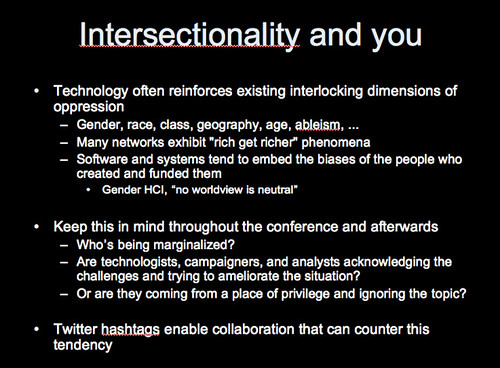I just made my first HTML comment here, at the end of the Lorelei experiment, pointing to its continuation with Leone (the theme not the director). w00t w00t!
It’s not at all obvious but by default WordPress blogs are set up to allow HTML in comments. There’s no preview feature or WYSIWIG editor though so it’s a little nervewracking to post something with formatting in it … I think I’ve got the ability to edit comments so I can always clean things up if need be.
[This is by the way an excellent example of a technology-imposed power differentiation between the original poster and commenters. While it’s not inherent in the blog format, and some systems avoid it (ezBoard and Joomla/Community Builder for example, using bbcode instead of HTML), it exists to a fairly large extent in most implementations:  Sharepoint by default has HTML disabled in the comments and a huge differential in font size — and doesn’t have preview; Blogger allows just a subset of HTML and doesn’t allow editing after the comments are submitted; etc.  But I digress.]
Of course once I had posted the comment I discovered that it wasn’t strictly-speaking necessary; WordPress had auto-generated a trackback from my continuation post, and even managed to extract a very useful summary. Impressive. What I really want is a combination of the two, both the explicitness of “story continued here” and the quick summary to be able to read in place and see whether to follow the link … that should be equally easy to generate automagically.
Looking closely at this reveals another power differential: links in posts get these kinds of trackbacks generated, but links in comments don’t. I’m not saying that’s a bad thing [there are a lot more comments than posts, so autogenerating this for links in comments might overwhelm threads with these notifications — and the comment-spam problem would be magnified hugely] but there is an asymmetry.
Or as they say in the What Kind of Postmodernist Are you? quiz: “Foucault. It all starts with Foucault.”
 Ever since Skud’s 2009 OSCON talk I’ve been meaning to check out DreamWidth, and now I finally am. My account there is kallistixf, and at least for the time being I’ll move some of my more personal posts there and keep Liminal States focused on social networks, diversity, innovation, software engineering, security, and politics. I think that’s enough topics, don’t you?
Ever since Skud’s 2009 OSCON talk I’ve been meaning to check out DreamWidth, and now I finally am. My account there is kallistixf, and at least for the time being I’ll move some of my more personal posts there and keep Liminal States focused on social networks, diversity, innovation, software engineering, security, and politics. I think that’s enough topics, don’t you?
 Sarah Blankinship and I are presented Securing with the Enemy: Social strategy and team of rivals at
Sarah Blankinship and I are presented Securing with the Enemy: Social strategy and team of rivals at 